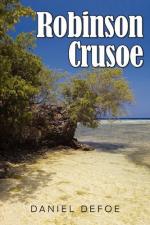|
This section contains 8,422 words (approx. 29 pages at 300 words per page) |

|
SOURCE: "Religion and Allegory," in Robinson Crusoe, George Allen & Unwin, 1979, pp. 51-72.
In the following excerpt, Rogers outlines various positions that critics have taken in interpreting Robinson Crusoe and discusses Defoe's religious background and the novel's treatment of sin.
The Puritan Inheritance
The most striking single development in our recent understanding of the novel has lain in the rediscovery of a pervasive spiritual motif. In the nineteenth century Crusoe had been treated mainly as an adventure-story, characterised by intense 'realism' of presentation. Robinson himself had been viewed as an upright and manly Englishman, whose Broad Church piety did not get in the way of his real mission—survival and ultimate prosperity. Even as lately as the 1950s it was usual to dismiss Crusoe's religious reflections as not much more than appliqué on the surface of the narrative. In the 1860s Karl Marx wrote: 'Of his prayers and the...
|
This section contains 8,422 words (approx. 29 pages at 300 words per page) |

|


